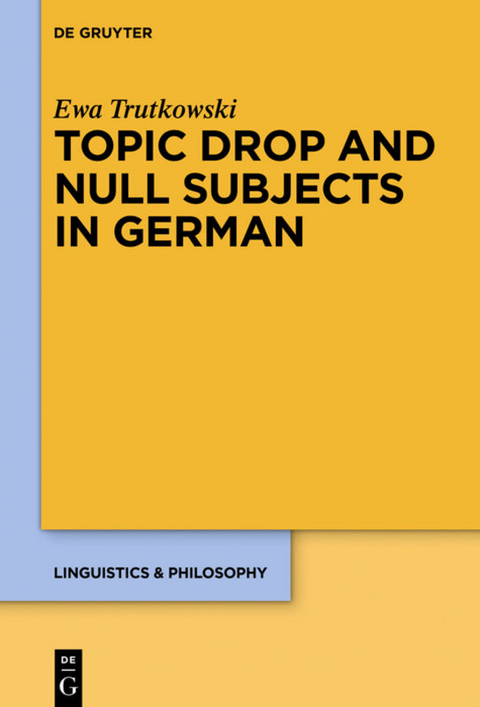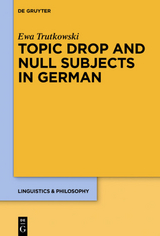Topic Drop and Null Subjects in German
Seiten
2016
De Gruyter (Verlag)
978-3-11-044413-1 (ISBN)
De Gruyter (Verlag)
978-3-11-044413-1 (ISBN)
Die Bände dieser Reihe diskutieren theoretische Probleme der Sprachwissenschaft, die traditionelle Fragen der Philosophie berühren. Zu den möglichen Themen gehören z.B. die Grundlagen der Linguistik als Wissenschaft, syntaktische Theorien sowie theoretische Fragestellungen der Semantik, Pragmatik und Phonetik.
This monograph deals with argument drop in the German prefield and it presents new insights into null subjects, topic drop and the interpretation of topic dropped elements. Major issues are (inter alia) the drop of structurally vs. obliquely cased arguments and the question on which basis nominative/accusative and dative/genitive can be kept apart. Furthermore, it is shown that the (im)possibility of phi-feature mismatches concerning the antecedent and gap in topic drop dialogues allows to differentiate between coreference and "real" (quantifier) binding. Aside from topic drop, (1st/2nd vs. 3rd person) null subjects are investigated across a couple of unrelated languages, also focusing on the presence of syncretisms within verbal inflectional paradigms. It is proven that 1st/2nd person null subjects in German are not an instance of antecedent-dependent topic drop but that they are licensed by discrete verbal inflectional endings. Thus, according to this property, German can be classified as a partial pro-drop language. Next to theoretical discussions and considerations this book offers a broad (empirically covered) data basis, which makes it suitable for both theoretically and empirically interested (generative) linguists.
This monograph deals with argument drop in the German prefield and it presents new insights into null subjects, topic drop and the interpretation of topic dropped elements. Major issues are (inter alia) the drop of structurally vs. obliquely cased arguments and the question on which basis nominative/accusative and dative/genitive can be kept apart. Furthermore, it is shown that the (im)possibility of phi-feature mismatches concerning the antecedent and gap in topic drop dialogues allows to differentiate between coreference and "real" (quantifier) binding. Aside from topic drop, (1st/2nd vs. 3rd person) null subjects are investigated across a couple of unrelated languages, also focusing on the presence of syncretisms within verbal inflectional paradigms. It is proven that 1st/2nd person null subjects in German are not an instance of antecedent-dependent topic drop but that they are licensed by discrete verbal inflectional endings. Thus, according to this property, German can be classified as a partial pro-drop language. Next to theoretical discussions and considerations this book offers a broad (empirically covered) data basis, which makes it suitable for both theoretically and empirically interested (generative) linguists.
Ewa Trutkowski, Johann Wolfgang Goethe-Universität, Frankfurt am Main, Germany.
| Erscheint lt. Verlag | 25.4.2016 |
|---|---|
| Reihe/Serie | Linguistics & Philosophy ; 6 |
| Zusatzinfo | b/w line drawings |
| Verlagsort | Berlin/Boston |
| Sprache | englisch |
| Maße | 155 x 230 mm |
| Gewicht | 505 g |
| Themenwelt | Geisteswissenschaften ► Philosophie ► Philosophie der Neuzeit |
| Geisteswissenschaften ► Philosophie ► Sprachphilosophie | |
| Schlagworte | Chomsky, Noam • Generative Grammar • Generative Grammatik • Noam Chomsky • Semantics • semantics; syntax; generative grammar; Noam Chomsky • Semantik • Syntax |
| ISBN-10 | 3-11-044413-5 / 3110444135 |
| ISBN-13 | 978-3-11-044413-1 / 9783110444131 |
| Zustand | Neuware |
| Haben Sie eine Frage zum Produkt? |
Mehr entdecken
aus dem Bereich
aus dem Bereich




